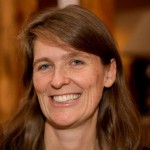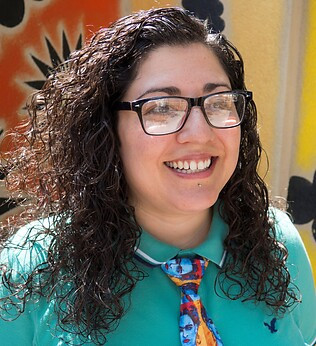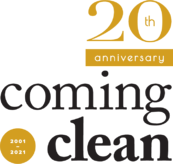May Spotlight: Women’s Voices for the Earth
|
|
Women’s Voices for the Earth (WVE)Members: Amber Garcia, Alexandra Scranton, Jamie McConnell, Zonya Dawson, Maria Ignacia Miranda Santis, Beth Conway, Robyn Windham, Coleen Samuels.
|
|
|
About WVEThe mission of Women’s Voices for the Earth (WVE) is to amplify women’s voices to eliminate the toxic chemicals that harm our health and communities. We imagine a world where the earth is taken care of, workers are paid well and treated fairly, and there are no toxic chemicals in our homes, our communities, or our environment. In this world, every point in the cycle of production and consumption – from extraction, to processing, to use, to disposal – contributes not just to a less toxic world, but to a thriving world. |
Our work with the Coming Clean NetworkWVE has been a member of Coming Clean since its founding 20 years ago. Alex Scranton helped organize the initial screenings of the Trade Secrets documentary that served as a launch pad for the collaborative network, and then she initiated the listserv that has kept the coalition in communication for the past 20 years. More recently members of WVE have been participating members in Coming Clean’s initiatives including:
|


|
"In order for us to continue the work and to be successful in the work, we really need to focus on cross-movement work, working adjacent with social justice movements. I think that's going to be key to ensuring that the work is really having as far reach for as many people as possible."— Amber Garcia |
What's the vision that you were striving to achieve and what are some of the ways that you worked to do that?
Amber: WVE is a national environmental health organization, and we work to eliminate toxic chemical exposure in a number of ways: policy advocacy, targeted corporate campaigns, education, and youth leadership development and community organizing. We believe that everybody deserves to live in a healthy and safe environment, which includes where you live, where you work, where you play, and where you pray. We are committed to working for justice and equity, and have found that our work over the past few years has really been focused there.
What has being part of Coming Clean’s network meant for your organization? Are there any accomplishments that you're particularly proud of?
Alex: I was there at the very beginning of Coming Clean, which is kind of neat. I was actually originally hired at Women's Voices for the Earth because we had funding to organize Coming Clean. We put together this loose coalition of groups around the Trade Secrets documentary, Bill Moyers documentary.
The funny thing about it was we were getting all these groups to sign on to agree to do showings of this movie, but the actual film was still under wraps and top secret. So we had never seen the film, we just believed in Bill Moyers and believed it was going to be a good film. It was interesting, putting together these lists of groups: There was such a diversity of different kinds of groups working to create a world without toxic chemicals.
Once we did the movie, it was like, “Okay, well what do we do now?” We brought all these people together and we see there's a lot of synergy here. One of the outcomes was to create this listserv where people who had given these film showings could then communicate and share information. That power of being able to connect across the country -- immediately you had access to all these different minds working on these issues. So that's definitely something I'm very proud of that still exists two decades later, and the listserv is still a major source of information where people can share information and learn from each other.
Is there any major lesson or learning that you feel that you're building on and bringing back to your work at WVE.
Alex: I think there's two things that I've really learned. One is the power of collaboration. No one organization can take on every issue out there. So knowing that there are other organizations who have more expertise and have more ability to do certain things and have different skill sets; or knowing that you can collaborate with other groups and get work done together is crucial. And different people really bring a lot to the table. So whether it's coming from a different lived experience, coming from a different skill set -- whether it's legal abilities or permits or whatever the expertise is -- being able to bring those things together to work collaboratively is incredibly important in getting the work done.
The second thing that I learned very early on was the importance of laughter, fun, and good relationships. Coming Clean did one annual meeting at least 15 years ago in New Orleans, and just as it happens in New Orleans, there's multiple places where you can buy feather boas. So there were a number of us who had bought feather boas just for kicks. And the next day at our very serious strategy meetings, there's a bunch of us wearing feather boas. There were presentations that had to be made and you had to wear a feather boa to do your presentation. It became this silly thing, but it really made it so much fun. Even though we were talking about such serious and impactful work, I realized how important being able to have some fun with it was to be able to make the work sustainable.
What are the biggest opportunities we have right now? What does your organization bring to the table that's unique?
Amber: Right now is a pretty big year for us. We just released a big report that has been a decade in the making: Beyond the Label, which talks about ingredients in cleaning supply products. We also had a big win in California on the Cleaning Products Right To Know Act back in 2017, and are finally starting to see some of these manufacturers listing the actual ingredients in their products, and helping us to take a look at that and share out -- with our membership, with our partners, with people who work with these cleaning supply products on a daily basis -- the health impacts of the exposure to some of the chemicals that are in the products.
I think the opportunity we have now, while we are still living through the effects of a global pandemic, while WVE has traditionally occupied the environmental health space, we are really branching out and trying to connect at the intersections of different issues that impact people's lives, and that are connected with toxic chemical exposure but hadn't traditionally been talked about in connection to each other. For example folks who are at the fenceline, people who are living in these areas that are close to toxic waste facilities and are not necessarily thinking about the chemical exposure because they also don't have access to quality and affordable food. And I think being part of the Coming Clean network really helps us to look at all those issues, talk about and strategize how they're interconnected, and find solutions.
Is there anything specifically you're working on now that you would love other people to know about or to work together with you on?
Amber: We're recruiting for a few fellowship positions that will be working with young folks in the fall. We would love to share that out, work with other young people who are interested in a part of maybe our partners’ work. We'll be sharing that out with the Coming Clean listserv. It's a really good opportunity for us to be building leaders, investing in leadership so that we can make sure that the work is sustainable.
20 years into the future, if your vision is realized what will be different? What do you hope to be able to say that WVE was able to contribute?
Alex: We work on toxic chemicals in consumer products, and right now to some degree you need to be somewhat sophisticated about knowing what these chemicals are in order to be able to avoid them. Our vision is that you won't have to do that. That these products will be made inherently safer and we won't be having to check labels for dangerous chemicals because they just won't be there, because they’ll be inherently safe before they ever go on the market.
The work that we've been doing over the years: pointing out certain chemicals, working with manufacturers to explain to them how they have to be thinking about the way they make products -- that it's not just doing a risk assessment on this chemical, but knowing who was using this product, what else are they being exposed to, and what other considerations in their life are affecting their health, and how is this product adding to that... 20 years from now I’d like to say WVE had a voice in getting that kind of systems thinking in the way products are designed.
"There's two things that I've really learned. One is the power of collaboration. No one organization can take on every issue out there, so being able to work collaboratively is incredibly important. Second, I learned very early on the importance of laughter, fun, and good relationships. We have to remember to keep having fun where we can, enjoy our colleagues, and enjoy the lighter moments. There's plenty of darkness out there, so it really helps to sustain the work."— Alex Scranton |




